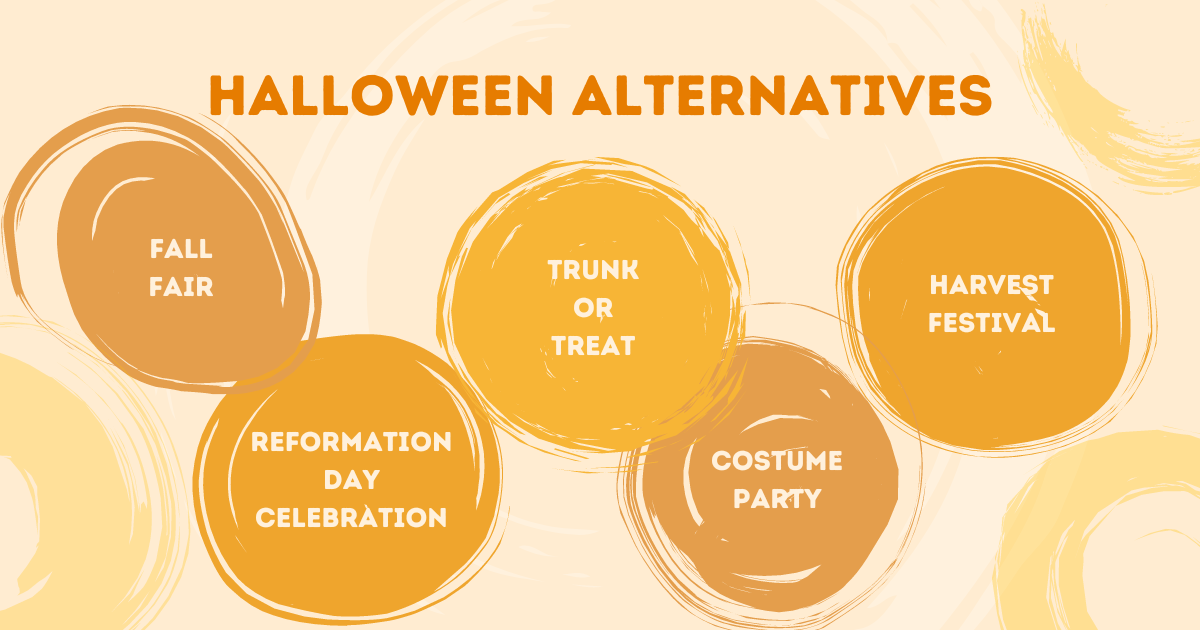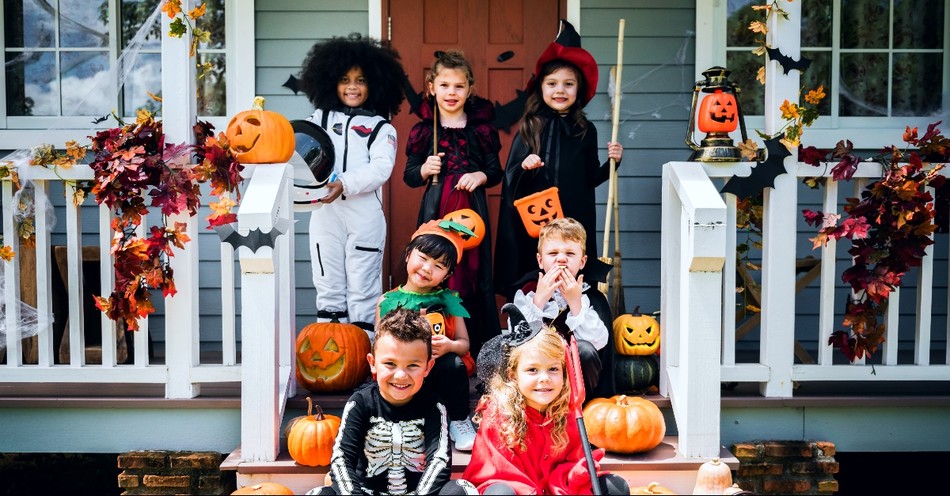Traditionally, October 31, which is named Halloween or All Hallows’ Eve, has been considered a pagan holiday. On All Hallows’ Eve, it is said that the souls and spirits of the dead are given the ability to roam the Earth. All Saints’ Day, or All Hallows’ Day, was a religious feast day celebrated on November 1. The feasting was to honor the Saints. Although there are differing beliefs as to its origin, everyone seems to agree on a connection to the ancient Celts over 2,000 years ago. Yet, many Christians have always been left wondering if they should celebrate Halloween.
Many Christians now celebrate Reformation Day on November 1, in place of Halloween, because it is the day Martin Luther chose to nail his 95 theses to the church doors. Some church communities choose to host a Trunk-or-Treat, which is considered an acceptable alternative to door-to-door Trick-or-Treating.
Members of the church decorate the trunks of their cars and hand out candy to children, it is expected that scary costumes and décor not attend. Other churches hold a Fall Festival on the evening of October 31. A fall-themed atmosphere and carnival-style booths help to mask the fact it is actually Halloween, except for all the people dressed in costume with children getting candy.
Those who practice witchcraft, Satan worship, or who consider themselves Pagan or Wiccan may still celebrate All Hallows’ Eve in a more traditional way, which includes many rituals to connect with the dead.
Clearly, Halloween is a controversial topic for Christian communities. Can a Christian celebrate Halloween in good conscience?
Table of Contents: Should Christians Celebrate Halloween?
- History of Halloween
- Is Halloween Evil?
- Why Some Christians Don't Participate in Halloween
- Alternatives for Christians
- Should We Celebrate?
What is the History of Halloween?
The history of Halloween traces back to ancient Celtic traditions, particularly the festival of Samhain, which marked the end of the harvest and the beginning of winter. This was a time when the boundary between the living and the dead was believed to blur, with spirits returning to Earth. Over time, Roman practices and Christian traditions merged with these pagan customs, transforming October 31 into what became known as All Hallows' Eve, preceding All Saints’ Day on November 1 and All Souls’ Day on November 2.
When Christianity spread across Europe, the Catholic Church sought to replace pagan customs with Christian observances. Pope Boniface IV established November 1 as All Saints' Day to honor saints and martyrs, with October 31 becoming All Hallows' Eve. However, many of the original Samhain customs persisted, blending with new Christian practices. Medieval customs such as "souling" (offering prayers for the dead in exchange for food) and "guising" (wearing costumes) further evolved into familiar Halloween traditions over time.
Read more: What is the History of Halloween?
Is Halloween Evil and a 'Bad' Holiday?
"The thief comes only to steal and kill and destroy; I came that they may have life, and have it abundantly," (John 10:10).
As a girl growing up, Halloween was generally viewed as a bad holiday. I still remember listening to the Adventures in Odyssey episode, “What Are We Going To Do About Halloween?” where they warned about the evils of Halloween as well as hearing similar teachings at church too.
We were taught to be afraid of evil things. Spirits, skeletons, and all manner of scary things were Satanic and to be avoided at all costs. Fun fact: The term Holy Spirit is mentioned at least 90 times in the Bible.
Typically, on Halloween night we would have something fun to eat and gather around the TV to watch an old scary movie. Although once, I did attend a “haunted church” hosted for the youth group by our church staff. Some years, my family would hand out candy to anyone who knocked on the door, and often a gospel tract would accompany the candy. We were pretty much like all the other Christians within our circles.
Now, in my own home, we do participate in Halloween festivities. For us, Halloween is not a celebration of fear or death — God kicked those to the curb through Jesus. We celebrate family being silly together. We celebrate the community around us. We celebrate dress-up. We celebrate sweetness. We celebrate life in all its abundance!
Have I not commanded you? Be strong and courageous. Do not be terrified; do not be discouraged, for the LORD your God will be with you wherever you go (Joshua 1:9).
We believe that Jesus can take what was intended for evil and flip it right around for good. History tells us that Halloween started out full of evil and fear, death, and torment. Those are things that my Lord has defeated. They no longer have a grip on me or little superheroes and princesses.
Sin breaks and kills — Jesus brings back to life. Fear lies to us — Jesus is the Truth.
But it has now been revealed through the appearing of our Savior, Christ Jesus, who has destroyed death and has brought life and immortality to light through the gospel (2 Timothy 1:10).
Why Some Christians Don't Celebrate Halloween
Choosing not to celebrate Halloween often comes from a desire to avoid participating in themes that glorify darkness, death, and fear—elements that are often associated with the holiday. At its core, Halloween has historical roots in pagan practices, with connections to witchcraft, spirits, and death, which some Christians feel conflict with the teachings of Christ, who has already defeated death and offers life and hope.
Many also believe that Halloween’s focus on evil and the demonic contradicts the call to live in the light of God’s truth. Celebrating a day centered around fear and the supernatural is seen as incompatible with the values of a faith that emphasizes peace, love, and overcoming darkness with the light of Christ.

So, Should You Celebrate Halloween?
He did not enter by means of the blood of goats and calves; but he entered the Most Holy Place once for all by his own blood, thus obtaining eternal redemption (Hebrews 9:12).
If your background includes witchcraft or a world revolving around the dark side to Halloween, I promise, I get it. I am not saying Halloween cannot be used for the unspeakable. Halloween might well be traumatizing for you, and with good reason.
I am terribly sorry for what you have experienced — but, I do challenge you to see how our God is bigger than evil and bigger than sin. Do not let fear continue to keep you captive.
There is no fear in love. But perfect love drives out fear, because fear has to do with punishment. The one who fears is not made perfect in love (1 John 4:18).
How and why we “do” Halloween has been actively taught in my home, in fact, I have heard it repeated straight out of the mouths of babes — while in the checkout line, with Halloween décor everywhere, with a line of people around — the week before Halloween, “Why do people have to have blood and scary stuff at Halloween? Jesus brings life and beat death; don’t they know that?”
Well, do they? That’s the point! The cross was not pretty. There was pain and suffering, blood, and violence. Do the people around you know that Jesus’ life-giving sacrifice on the cross completely crushed death? That the agony and misery and terror celebrated every year on October 31 was already lived out by Jesus and it is finished?
Should Christians really celebrate Halloween? Yes, you can because the blood of Jesus has redeemed Halloween.
“You, dear children, are from God and have overcome them, because the One Who is in you is greater than the one who is in the world” (1 John 4:4).
The question of whether Christians should celebrate Halloween comes down to personal belief and interpretation, with opinions varying across individuals and denominations. Some feel uneasy about its pagan roots and associations with the occult, while others see it as a fun, cultural event focused on costumes and community.
Many Christians find ways to engage without compromising their faith, choosing alternatives like Harvest Festivals or Trunk-or-Treat events. For parents, Halloween can be a great teaching moment about discernment, history, and kindness. Others see it as a unique opportunity to connect with neighbors and be a positive presence in the community.
Ultimately, it’s a personal decision—whether to join in or sit it out. What matters most is aligning with your faith and values while keeping your relationship with God and your community strong.
Read more:
What Does the Bible Say About Halloween?
Photo Credit: ©iStock/Getty Images Plus/Rawpixel




